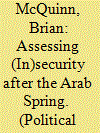| Srl | Item |
| 1 |
ID:
126413


|
|
|
|
|
| Publication |
2013.
|
| Summary/Abstract |
The struggle to shape the narrative of Libya's postwar transition is being fought more intensely outside of the country than within it. The legitimacy of the military intervention in Libya by the West, supported by Qatar and the United Arab Emirates (UAE), has become tied to the perceived success or failure of the transition process: A positive outcome (i.e., the installation of liberal democracy) would legitimize NATO's intervention and, with it, the merits of interventionist military doctrines more broadly; a failure chastens such a policy. Putting aside questions about whether the legitimacy of the intervention should be primarily judged by the outcome of the transition, the practical consequence of this ulterior motive for judging the success or failure of the transition has warped international coverage of Libya. It has created incentives for observers to cherry-pick their portrayal of events so that they can present unambiguous conclusions about the progress of reforms and the transition in general (Rubin 2013; Wagner and Cafiero 2013). This myopia is unhelpful; it distorts international policy on Libya and results in scant analysis of the underlying (and often antithetic) social, political, or security dynamics shaping the transition. To remedy this, the following analysis examines the micropolitics of violence undergirding Libya's transition. As its basis John Gledhill's tripartite framework is used for understanding the causal pathways to collective violence during political transition (see "Editor's Introduction"). The contributions on Yemen and Egypt, which follow this article, also adopt Gledhill's framework, permitting comparison among these cases.
|
|
|
|
|
|
|
|
|
|
|
|
|
|
|
|
| 2 |
ID:
091069


|
|
|
|
|
| Publication |
2009.
|
| Summary/Abstract |
In this article we propose a new typology for insurgent groups to explain why in such remarkably similar conflicts-Sri Lanka and Aceh-the impact of the 2004 Indian Ocean Tsunami was so different. We argue that two principal factors shape all rebel groups by defining their incentive structures: the efficiency of the return on investment of the primary source(s) of support and the group's territorial objectives. The former factor is especially strong in explaining the different choices made by the LTTE and GAM. In Sri Lanka, the availability of lucrative resources outside the country has made the LTTE leadership inimical to compromise, threatened by relief aid, and less reliant on the local population. Lacking access to such high-return funding sources, GAM on the other hand was more closely linked to the needs of the local population and found greater value in both outside aid and a comprehensive settlement.
|
|
|
|
|
|
|
|
|
|
|
|
|
|
|
|